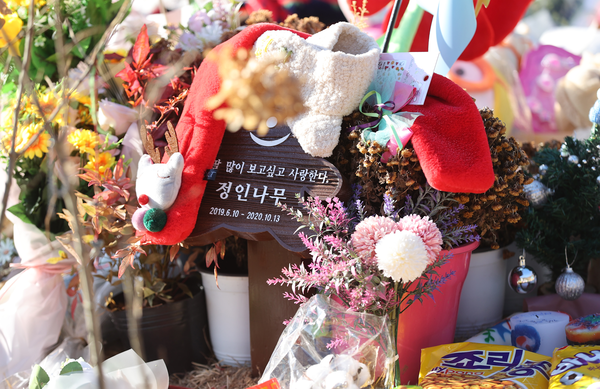Input 2021.01.10 19:07 | Revision 2021.01.10 20:11
Jeong In-yang, who died 16 months after birth due to the abuse of her adoptive parents, will be held on the 13th at the 13th Criminal Division of the Seoul Southern District Court (Judge Shin Hyeok-jae). Yang Mo Jang was convicted of violating the Child Abuse Punishment Act (child abuse fatality), and his adoptive father, Ahn Mo, was prosecuted without custody for violating the Child Welfare Act (child abuse or neglect). It is known that the prosecution is considering applying the murder charges to Jang.

According to the prosecution, Jang is accused of assaulting and abusing Jeong In-yang from June to October last year, and inflicting a strong shock on his back to cause him to die. From March to October last year, Jeong In-yang was left at home and in the car 15 times, and she was also charged with emotional abuse by pushing the stroller against the elevator wall. Ahn was charged with not taking any action even after being aware of Jang’s abuse and Jung In-yang’s health status.
It was investigated that Jeong In-yang died from a back shock and abdominal injury. Specifically, it was not revealed in what way the shock was inflicted, and the prosecution applied the charge of child abuse and lethality to Jang instead of the murder charge. However, it is known that Jung In-yang’s pancreas was amputated and died from bleeding in the abdominal cavity, and public opinion was raised that the adoptive parents should be punished for murder. More than 200,000 people agreed to the Blue House petition with the same content, filling the requirements for response.
The Korean Pediatrics and Adolescents Medical Association submitted an opinion to the prosecution, saying, “(Mr. Jang) clearly had intentions of murder, or at least knew the possibility of the victim’s death.” They said, “Because the pancreas is affected by an external force at the end, it is rare to damage the pancreas. It is clear that the pancreas was inflicted on the stomach in a traffic accident.” He said, “There was a deliberate price on the abdomen, and there is a high possibility that the price was enough to cause a fatal injury again in a non-fatal state,” he said. “It is appropriate to apply the crime of intentional murder or the crime of unwritten intention.” Unwritten intention is to continue knowing it will be a crime.
The Korean Women’s Bar Association also issued a statement and insisted that the murder charge should be applied to Jang. They said, “The public authority that existed for the people until the 16-month-old victim endured pain and died due to organ rupture, etc., was completely helpless,” he said. “Please actively review the crime of murder.”
In order for the murder charge to be applied, it must be proved that Mr. Jang’intentionally’ killed In-yang Jung. The specific action that caused Jung In-yang to death must also be disclosed. The prosecution recently asked professional autopsy doctors to reassess the cause of Jung In-yang’s death. If the prosecution receives a statement about the cause of death from the autopsy doctor and the intention is proved, it is expected that the charges of murder will be applied by changing the complaint. If murder charges are applied, Jang’s sentence also increases. According to the Supreme Court’s sentencing standards, the basic sentence for murder is 10 to 16 years, and as a weighting factor, even medium sentences with more than arms can be sentenced. Child abuse lethality is relatively low, with a basic 4-7 years and a weighted 6-10 years.
Citizens also submitted hundreds of petitions to the court with the intention of “strict punishment for adoptive parents” as the case was re-examined. In this regard, the court said, “There is a concern that it will affect the judgment,” and “I will not look at the petition until I judge whether I am not guilty.”
